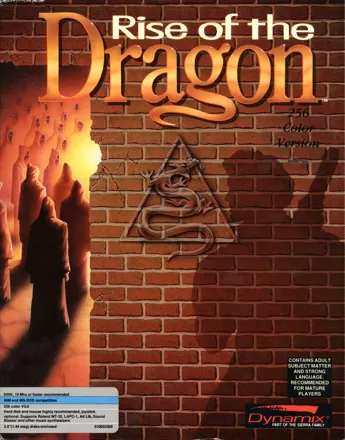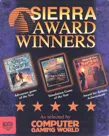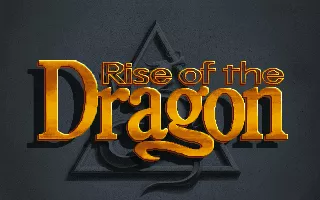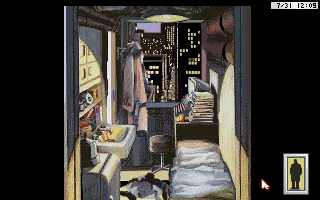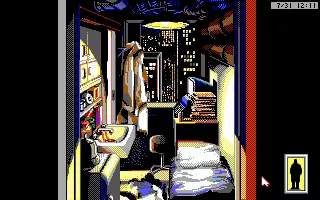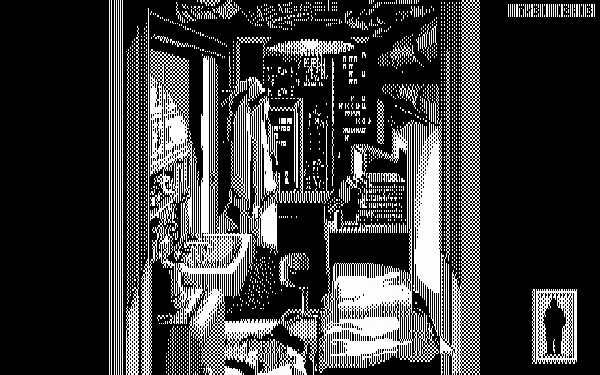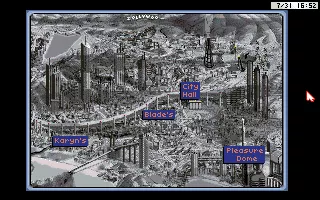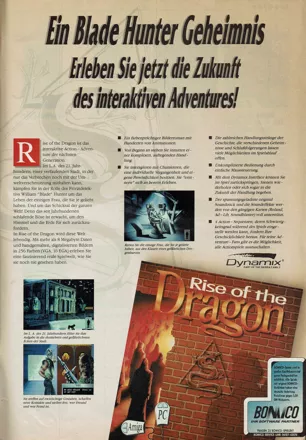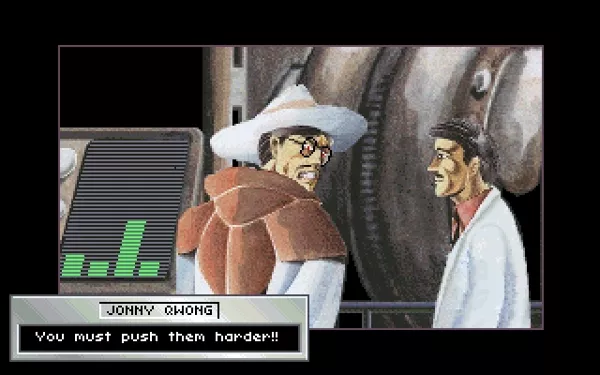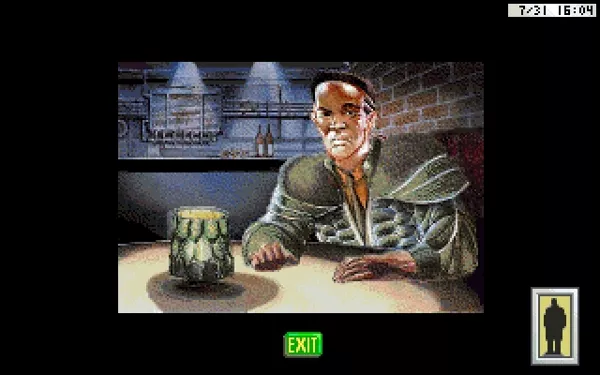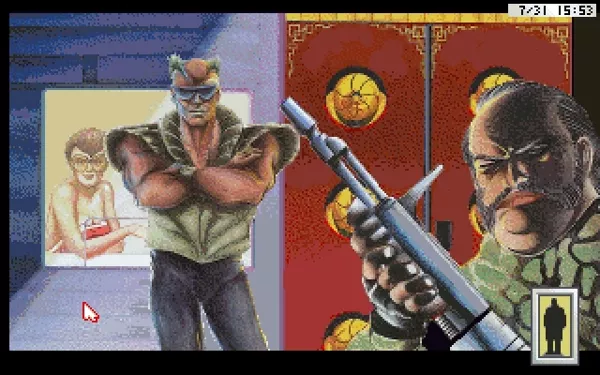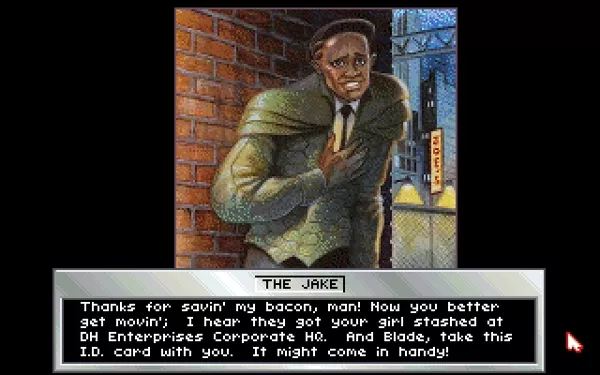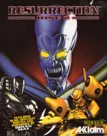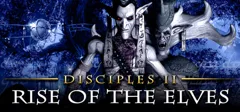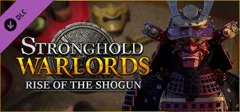Rise of the Dragon
Description official descriptions
The year is 2053, and Los Angeles has turned into a grim place ruled by crime and corruption. William 'Blade' Hunter is a private detective who once was a police officer. He is asked to investigate a horrible murder of the mayor's daughter, whose body was mutilated. As Hunter begins to search for clues that would help him solve the crime, he uncovers a conspiracy involving a deadly drug and a powerful criminal syndicate behind it.
Rise of the Dragon is a futuristic first-person adventure game. The game's visuals are reminiscent of a comic book, with digitized photos of actors and hand-painted backgrounds. Unlike most other adventure games of the time, it relies less on inventory puzzles and more on specific choices made by the player. The game has an internal clock and requires the player to plan the protagonist's moves ahead in order to be in the right place at the right time. Dialogues with multiple choices are utilized as a gameplay tool; a wrong choice will often lead to a premature end of the adventure.
There are two side-scrolling action sequences in the game; both can be bypassed without penalty if the player character dies several times in a row. The Sega CD version does not allow the player to skip these sequences. In addition, it uses a different color palette with a greenish tint, and has voice-overs for the dialogues.
Spellings
- ライズ オブ ザ ドラゴン ~ブレイド・ハンター・ミステリー~ - Japanese spelling
Groups +
Screenshots
Promos
Credits (DOS version)
19 People (17 developers, 2 thanks) · View all
| Designer and Director | |
| Art Director | |
| Conceptual Art and Characters | |
| Game Development System | |
| Artists | |
| Programmers | |
| Arcade Programming | |
| Audio Director | |
| Music and Sounds | |
| Original Score | |
| Dialogue and Text | |
| Original Story | |
| Quality Assurance Manager | |
| Documentation Design, Layout and Writing by | |
| Special Thanks to | |
| [ full credits ] | |
Reviews
Critics
Average score: 77% (based on 38 ratings)
Players
Average score: 3.8 out of 5 (based on 90 ratings with 12 reviews)
The future doesn't look good for LA
The Good
In the late Eighties, a small company called Dynamix created Project Firestart, an action/adventure game for the Commodore 64. It had features that were uncommon at the time, including cinematic sequences, video images, and action sequences. All three of these game mechanics formed the basis for Rise of the Dragon, their first MS-DOS adventure game.
Anyone who have seen Blade Runner will know that Dragon shares many similarities with the movie, in both story and style. The only difference is that we are investigating what happened to the mayor's daughter, not tracking down Replicants who pose a threat to society. Maybe it is also a coincidence that your character is also named Blade, and that the game is set in Los Angeles?
The games makes use of an internal clock, which updates every five seconds and is on the top-right of the screen, above your inventory. Like in real life, events happen at certain times. The inventory also has a clock, but with buttons that let you go forward a minute or a whole hour. Having these forward buttons is ideal for skipping time because you spend most of the time doing nothing until near the end of the game. Dragon is the only Dynamix adventure game where a clock is visible on-screen as you interact with the environment.
The graphics are quite impressive. All of the environments look as if they are taken right out of a comic book. The only difference is the animations in most of the environment, some of them, particularly the outdoor environments, blend in with the game's setting (ie: it is always dark and gloomy, no matter where you go or what time of day it is). Beautiful cinematic sequences are scattered throughout the game, and tell the player that something really big is happening. The game's introduction – where we discover what happened to the Mayor's daughter – is superb. Dragon comes complete with a comic book that continues where the introduction left off, where the mayor comes into Blade's apartment instead of contacting him on vidphone.
The realism the developers added to the game is amazing. Nearly everyone you meet remembers what you did to them. There are dialogue branches, and saying the wrong things to your contacts will result in them getting angry, which will jeoparize your chances of getting new leads. Character portraits often accompany the dialogue, and they are complete with facial expressions that reflect the mood they are in.
The music and the sound effects are great, often blending in with what is happening on screen. The game supports popular sound cards at the time, including the Adlib, SoundBlaster, and Roland MT-32. The introduction even contains digitized speech that can only be heard if you are playing with SB. In my opinion, the game's speech is nothing compared to what you hear in the Sega CD version, which does include full speech throughout the game as well.
There are arcade sequences scattered throughout the game, and these are similar to the action scenes in Project Firestart, released one year earlier. These arcade sequences are fun, but the controls need to be getting used to. They also work just like any arcade game – you shoot, jump over things, walk under things, turn off switches, and other stuff. They usually take about two minutes to get through, and it is worth it if you want to see yourself defeat your adversary. If these arcade sequences are too hard, then the game will eventually let you skip them and move on. Dragon gives you the opportunity to save your game before each arcade sequence, and this is ideal if you want a break from all that adventuring and just want to kill some bad guys.
The game can be replayed, especially if you want to take different dialogue branches to achieve the same result. For example, you can cheer your girlfriend Karyn up by giving her some flowers in one game to get a set of keys. Then, in your next game, you can make her angry and still get your keys. Let's say you skip those arcade sequences in one game, but you want to complete them in the next. There are also those alternate paths you need to consider to achieve what you need to do.
The Bad
As I said, you spend a lot of time doing nothing in the game, and the developers could have added more stuff for you to do. Why not do extra stuff at the warehouse instead of just blowing it up, or doing more stuff at other locations?
The Bottom Line
If you played Project Firestart or watched Blade Runner, then you know that the roots of Rise of the Dragon can be traced back to these two titles. With great comic book graphics and excellent sound that blend in with the game's atmosphere, Dragon is sure to please any cyberpunk fan out there. It's worth getting a copy of this game from eBay or other retailer, since it includes a comic book that sets the scene up quite nicely. Out of all the three adventure games Dynamix created, Dragon still remains one of my favorites to this day.
DOS · by Katakis | カタキス (43091) · 2014
One interactive Sci-Fi novel that wont leave you untouched
The Good
The first thing that struck me where the great looking graphics in Blades small but futuristic apartment. The greatly seductive sound of drops hitting a metal sink together with that distant pixel skyline outside the window drags you right into the screen and universe, a mystical and depressive such. The game is built on hand painted still images and is played in real time, witch means that if you have an appointment at 5 and the time is 3 you just have to wait. The storyline was strongly plotted out for you and there where no such thing as dynamic gameplay, but still they manage to deliver the feeling of accomplishment to the player. Throughout the game you encounter several puzzles that are directly tied to the story. The sequence where you sneak down the sewer to redirect some electrical weiring are a master piece.
In short this game with its graphics, sound and music absolutely kidnaps you for a couple of hours and holds you helplessly hostage in they Blade Hunters future universe, you get to live a part of his life.
The Bad
There are a couple of shoot'm up segments in the game that are a total catastrophe. Its blocky steering and inexact shooting gets you extremely frustrated when all you want is to know how the adventure continues. Further more its very short and just as you are about to log on to Ebay to get your self the Blade outfit you´v saved the day and the game is over.
The Bottom Line
An interactive Sci-Fi novel in the Blade runner universe. There are 3 different game types bundled in one. The lined out RPG, the puzzles and the, from the side, shoot 'em up type. Its a typical Hollywood story with a strong atmosphere but a short lifespan. You even play the love life.
Amiga · by Birjer Rosenkrantz (3) · 2005
The Good
Rise of the Dragon is a pretty atypical game, it's one of those weird adventure games that Dynamix tried to popularize with titles like Heart of China, Willy Beamish and that old secret agent game.
In case you have no idea what of what I'm talking about you should know that come the early 90's, Dynamix tried to put their own twist into the adventure game genre, and released this weird collection of titles that stayed pretty much within the boundaries of the adventure genre, but used a first person perspective, included action sequences and ran against an internal clock among other details.
The changes in the typical adventure game design that simplify item interaction and the inclusion of day cycles and time limits place the focus mostly on scripting and storytelling rather than on mindless puzzle solving. The "adventuring" in these games deals mostly with knowing how to deal with each character and following the storytelling logic of the game while the game world around you does it's own thing, and thus these games work mostly as early ancestors of interactive movies with the point being mostly to enjoy the game world around you. The games also feature a universally simple and streamlined interface with little to no glitches that allow you to access the game's configuration, equip items and interact with the game world with little more than a mouse click, so with those issues solved you can bet there's plenty of room to develop the creative side of things.
Now, Rise of the Dragon is probably the most evolved of these games, and exploits most of this design's true potential for storytelling. Instead of the Kid-simulating quest of Willy Beamish, "Dragon" is a gritty detective story were you have to follow around leads, evidence, clues and need to be in certain places at the right time for things to develop.
The setting of Dragon is a true child of the 80's sci-fi. An edgy, post-modern blend of narrative styles (in this case, the police dramas and its Noir counterparts) mixed into a decidedly pessimistic retro-futuristic world where everything just plain sucks. If you are even slightly familiar with the cyberpunk genre then you know the basics, and they are all here: overpopulated urban sprawls, extreme cultural blends due to the extreme globalisation, corrupt states, rampant crime and lots of assorted garbage on the streets.
Basically the same blend that gave life to Blade Runner, the movie that to this day most closely represents the spirit spawned from this type of sci-fi and which most obviously influences Rise of the Dragon. Just like the movie, "Dragon" also takes several cues from the underground comics of the 80's, specially the European sci-fi that was so popularised in magazines like "Metal Hurlant", and in an excellent stylistic choice, the game's graphics are composed of lovely hand-drawn comic book illustrations that come to life in VGA with loads of colorful details and moody hues. The backgrounds are pretty much ripped from the pages of a comic book, being static screens that nevertheless exploit their perspective and include (being a game and all) looping animations and day/night variations of themselves. The characters themselves are equally rendered, with excellent (albeit completely still) drawings both on the cutscenes and the background overlays. The music is equally well crafted, being composed of a collection of catchy synth tunes that follow the tracks of Vangelis classic soundtrack for Blade Runner. It fits the game like a glove and manages to stay with you even after the game is long finished (I still remember the subway station music as if it was yesterday).
But so much about the game world, what about the game? As I mentioned the tight scripting-oriented design works perfectly with the game's concept. Yes, you have an inventory and get to use your items around, but mostly you have to keep an eye out for your surroundings, gathering clues around crime scenes and chatting with the right people and being smart about what you say or not with the use of the good'ol dialogue tree.
The most dedicated scripting feature is of course the game's internal clock, which goes up with every action you make and the travels you take around the city. Not only does it condition several events, ignoring it will cause dire consequences to your investigations, as for example arriving late to a meeting with a contact might result in his death, or not showing up at the correct timeframe might cause you to just waste your time (hint: the club's only alive at night) and wasting time is something you do not want to do, as the bad guys are always on the move and develop their schemes continually. Additionally the game imposes a realistic logic to your character's behaviour and those around him, ie: undercover means you do not wave your gun around asking were the bad guys are hiding (whether you have a weapon equipped or even in your inventory affects what places you can enter and who you can talk), you can't walk around the streets naked and be taken seriously or leave your house and then try to enter without your keys (duh!), and your girlfriend requires a minimum amount of TLC if you want her to stick by you and help you out. Some of these features work as ways of branching your investigation, but mostly they serve as a way to increase the sense of realism in the game and deepen the gameplay with simple details.
The Bad
The graphics in the game are excellent but, due to the low resolution, appear extremely pixellated and a lot of their charm is lost, pity. The story, while including lots of adult themed details and interesting events falls to several shortcomings from a scripting point of view. Basically this is a detective story were you already know who did the crime. Yes, as I understand it, the mystery of solving who did what is not the first priority here, as it wasn't in Blade Runner. But it's fair to note that Dragon is pretty much devoid of the existential and stylistic elements that make BR such an interesting movie, thus leaving you with a pretty bland experience story-wise with extremely clichéd characters. From the wise-cracking and horribly named detective ("Blade Hunter".... PFFFFF!!) to the evil, evil BWAHAHAAHAHAA "evil" bad guy that hides somewhere in the city waiting for you to find him. There are good moments, mostly exploiting the adult nature of the story, and even some interesting developments, like the bad guys hunting YOU down for a second or so. But mostly it's an extremely oversimplified storyline that doesn't do much with all the potential it's got, developing fast into a "save the babe and the world" scenario before you know it.
The action sequences are another point to gripe about. They are pretty much the best proof there is as to why Dynamix never did an action game. They are horrible, poorly-controlled abominations whose only good element is to be able to skip them without penalization after you've failed them enough times (for the record, save for the last hellish one I finished all of them properly, ahum).
I would also have preferred to see more in the way of branching events, as there are some, but not nearly enough for the game to qualify as a non-linear experience. For instance, there's a moment where you meet up with a nice babe in a club, and if you keep laying on the charm, you'll walk home with her to further uhm... "investigate" her leads, however just as luck would have it, you cross paths with your girlfriend and after a scene she dumps you on the spot. Pretty cool, huh? Of course, as soon as this happens a nice sign pops up saying that your ex was critical to the game thus you won't be able to finish your adventure and you'd better reload... Niiice. This game would have been much more of a critically acclaimed classic if little moments like these were fully developed, I mean what if you could have continued the game with the babe from the club instead of your trusty girlfriend, huh? Now there's an option I would have loved to explore, not to mention that without these alternate paths the game falls to the poor replay value problems that would plague interactive movies in the future.
The Bottom Line
Basically the playable version of an issue of Heavy Metal magazine minus the gratuitous sex and gore. Has enough interesting details and game play depth as to be considered a true jewel of the adventure gaming genre (an extremely odd and atypical jewel, but a jewel nonetheless), yet lacks that extra oomph that would have propelled it to videogame stardom. Still, an extremely recommended experience for anyone, and one of the seminal cyberpunk games (Non-Gibson influenced though) from the early 90's.
DOS · by Zovni (10504) · 2004
Trivia
Development
Rise of the Dragon appears to have been coded in Turbo C++.
Messages
Messages hidden in the main executable:
Boy, am I tired. Better get some sleep in about an hour.You have chosen to run the game with only %s bytes of memory! You are on your own!(this is presumably when the user has decided to run the game without enough free DOS memory available)
References
- One of the patrons in the Pleasure dome is named "FU BAR".
- David Wolf makes an appearance outside the Pleasure Dome--he strolls past in a tuxedo if you wait long enough. (David Wolf was the main hero of Dynamix's earlier game David Wolf: Secret Agent.)
- In Heart of China, another game from Dynamix, if you talk to some people in Ho's bar, some people will say "Bahumat lives!". A reference to the main villain in Rise of the Dragon.
SEGA CD version
The Sega CD has automatically-converted graphics from the 256-color originals, but (probably due to the Sega's limited color palette and palette restrictions) everything has a green cast. Check screenshots for comparison. Also some things were cut from the game: an ammo clip besides a telephone, all but one strippers in the bar and a sequence in which the protagonist has sex.
Versions
Rise of the Dragon was released in two separate packages for the PC: A 256-color VGA/MCGA version that took up about 7 megabytes, and an EGA/CGA version that, understandably, took up half that size. The 16-color EGA version, on the other hand, has mostly redrawn graphics based on the 256-color originals.
Awards
- Computer Gaming World
- November 1991 (Issue #88) – Special Award for Artistic Achievement
- November 1996 (15th Anniversary Issue) - #83 in the “150 Best Games of All Time” list
- November 1996 (15th anniversary issue) – #12 Most Innovative Computer Game
Information also contributed by PCGamer77
Analytics
Upgrade to MobyPro to view research rankings!
Related Sites +
-
Game Nostalgia
Provides extensive background info for Rise of the Dragon, pictures of the cast, full credits with shots and info about the design team, specific details about the game, various goodies, all musical themes, shots of every location in the game, saved games, a list of reviews, including a "nostalgic "review and tech specs.
Identifiers +
Contribute
Are you familiar with this game? Help document and preserve this entry in video game history! If your contribution is approved, you will earn points and be credited as a contributor.
Contributors to this Entry
Game added by Trixter.
Amiga, SEGA CD added by POMAH. Windows added by Cavalary. Macintosh added by Terok Nor.
Additional contributors: Shoddyan, Sciere, martin jurgens, Patrick Bregger, Starbuck the Third, ZeTomes, Shankao, Kayburt.
Game added March 20, 1999. Last modified January 27, 2024.
